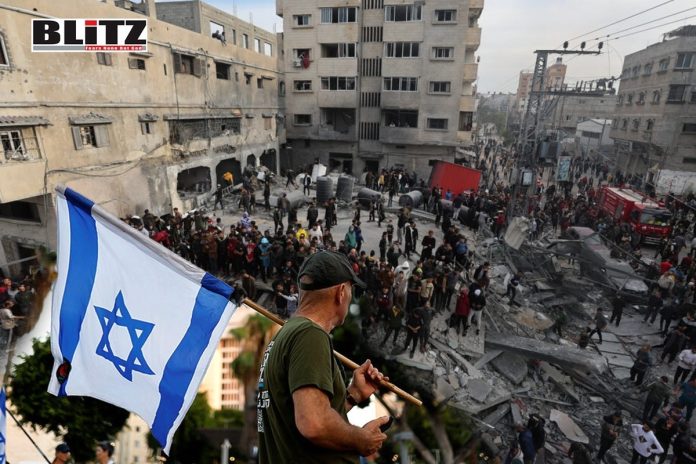The escalating tensions between Israel and Hezbollah, and the ominous prospect of renewed conflict in Lebanon, global leaders are urgently seeking effective measures to avert a disastrous escalation. The recent targeted killing of a Hezbollah officer by Israel has reignited apprehensions regarding a widescale conflict, underscoring the gravity of the situation. With the specter of heightened hostilities looming large, there is a pressing need for immediate action to defuse tensions and forestall the dire consequences that a full-scale confrontation could unleash upon the region.
The recent statements by Israeli Defense Minister Yoav Gallant, warning of additional military measures against Hezbollah in Lebanon, highlight the imperative for diplomatic intervention. The persistent cycle of violence between Israel and Hezbollah not only imperils Lebanon’s stability but also casts a shadow over broader regional security concerns. Urgent diplomatic efforts are warranted to mitigate the escalating tensions and mitigate the far-reaching ramifications of prolonged conflict in the region.
With Israel ramping up its efforts to track down Hezbollah operatives, the looming threat of retaliation and a wider conflict becomes increasingly imminent. The prospect of a devastating escalation, endangering Lebanon’s infrastructure and civilian populace, emphasizes the urgent necessity for prompt measures to quell tensions and prevent further escalation.
Meanwhile, evolving regional dynamics, Turkey has emerged as a promising mediator in the ongoing crisis. Recent diplomatic gestures between Turkey, Saudi Arabia, and Egypt indicate a growing readiness to collaborate on matters of regional security. President Erdogan’s diplomatic initiatives with Egypt and Saudi Arabia, alongside Iran’s recent overtures to Riyadh, signal a potential alignment of interests aimed at fostering stability in the region. This emerging convergence underscores the importance of multilateral cooperation in addressing complex security challenges and promoting peace across the Middle East.
Against the current backdrop, there is an increasing acknowledgment of the necessity for a buffer to forestall further escalation within Lebanon. The limitations of the existing UN Interim Force in Lebanon (UNIFIL) have become apparent, prompting the exploration of alternative measures to uphold Lebanon’s security. In this context, Turkiye’s engagement emerges as a propitious avenue to tackle the crisis. Given its existing involvement through a Turkish contingent within UNIFIL, Turkiye stands ready to bolster its military presence in Lebanon. This augmentation offers a strategic opportunity to contribute significantly to de-escalation efforts, leveraging Turkiye’s regional influence and operational capabilities to mitigate tensions and safeguard Lebanon’s stability.
An increased Turkish presence could serve as a deterrent against further Israeli incursions into Lebanese territory, while also exerting pressure on Hezbollah to refrain from provocative actions. By providing a buffer zone between the two adversaries, Turkiye could help prevent the outbreak of full-scale hostilities and protect Lebanon from the ravages of war.
Turkiye’s participation would necessitate concessions from all stakeholders. Notably, Hezbollah might express reservations regarding the presence of Turkish troops in southern Lebanon, fearing potential constraints on its operational autonomy. Nonetheless, amidst the looming threat of extensive destruction, Hezbollah may perceive Turkiye’s involvement as a pragmatic alternative to outright warfare. The imperative to avert catastrophic consequences could motivate Hezbollah to cautiously consider Turkiye’s role, recognizing the potential for mitigating tensions and preserving Lebanon’s stability through diplomatic engagement.
Turkiye views its engagement in Lebanon as a chance to bolster its regional sway and promote stability in the Middle East. By spearheading diplomatic initiatives to resolve the crisis, Turkiye aims to elevate its stature as a pivotal actor in regional dynamics. This proactive approach not only enhances Turkiye’s relationships with key stakeholders but also solidifies its position as a proactive advocate for peace and stability in the tumultuous landscape of the Middle East.
Furthermore, Turkiye’s engagement holds the potential to tackle broader regional dilemmas, such as the protracted conflict in Syria. Through diplomatic negotiations that yield concessions from Iran regarding Syria, Turkiye could not only advance its strategic interests in the region but also alleviate domestic pressures stemming from the Syrian refugee crisis. This multifaceted approach underscores Turkiye’s proactive role in addressing complex regional challenges and underscores its commitment to finding comprehensive solutions to enduring conflicts.
For a successful agreement, Lebanon requires a functional government capable of engaging in such arrangements. Hezbollah’s collaboration in establishing a government acceptable to the international community is indispensable for advancement. Without Hezbollah’s cooperation, progress towards resolving the crisis would be severely hindered, underscoring the critical importance of inclusive governance in navigating Lebanon’s complex challenges.
Turkiye’s potential role in mitigating tensions in Lebanon offers a glimmer of hope amid the specter of conflict. By providing a buffer between Israel and Hezbollah, Turkiye could help prevent further escalation and pave the way for a diplomatic resolution to the crisis. With the support of key regional players and the international community, Turkiye’s involvement could prove instrumental in safeguarding Lebanon’s security and promoting stability in the Middle East.



